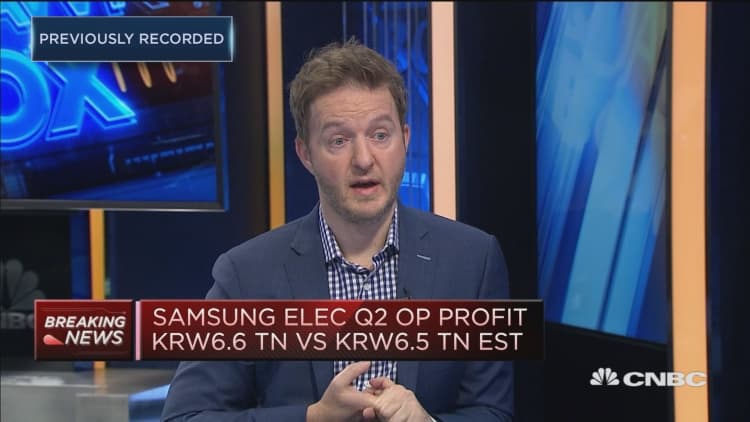
An ongoing trade conflict between Japan and South Korea may potentially boost memory chip prices, which have remained low for about a year, according to an analyst.
Due to a growing dispute over wartime forced labor, Japan announced stricter restrictions on exports of three crucial high-tech materials that are used by South Korean tech companies like Samsung to make memory chips and smartphone displays.
The situation could escalate this week if Japan removes South Korea from a list of trusted trade partners that enjoy preferential treatment.
Samsung may be forced to look for alternative supply sources for all its technology parts and materials imported from Japan, that are needed to build its memory chips, batteries and display screens, Mark Newman, managing director and senior analyst at Sanford C. Bernstein, said on Wednesday.
"They need to qualify those alternatives," Newman told CNBC's "Squawk Box," referring to the process of selecting the right supply chain partners to buy materials from, and to ensure they meet Samsung's quality control standards.
That process, Newman explained, normally takes two to three months and may result in a reduction of Samsung's memory chip inventory — the memory business is a significant component of Samsung's overall earnings.
"There's a potential the production could go down for a few weeks, which would have a significant positive impact on memory prices if that did ever happen," Newman said, adding that spot prices have already started rebounding. Still, he added, it's not an immediate emergency for Samsung as the company has "enough inventory to continue production right now."
Reuters reported that South Korean chipmakers were already sounding out non-Japanese suppliers to secure stock for the three high-tech materials that were restricted in July.
Samsung Q2 profits down 56%
Japanese Prime Minister Shinzo Abe's cabinet plans to endorse Seoul's removal from the so-called "white list," which is expected to go into effect late August, the Nikkei business daily reported.
South Korea relies heavily on Japanese exports of intermediate parts and materials, particularly electronics components and chemical products, in its manufacturing industry.
If the move goes through, Japanese exporters will need licenses to ship hundreds of items to South Korea that could potentially be used in weapons-related applications. Getting those approvals could take time and delay business processes. In turn, that may slow down electronics exports and manufacturing in South Korea, according to analysts.
Samsung reported a 56% decline in second-quarter operating profit for the three months that ended June due to falling memory chip prices.
On its earnings call, a Samsung executive said the company is facing "difficulties due to the burden of this new export approval process, and the uncertainties that this new process would bring."
For nearly a year, the global semiconductor industry had been undergoing a period of inventory adjustment that has kept demand low and caused a supply glut, which in turn squeezed prices. Analysts have said they expect a recovery to get underway in 2020.
Still, Samsung said its second-quarter memory demand rose despite weak business conditions and that it expects further increase in the second half of the year due to "strong seasonality."
'Final innings' of a downturn
Some experts have said the trade dispute between Tokyo and Seoul may not necessarily result in any major disruption to supply chains.
"As long as these materials come out of Japan and go to a distributor, then it could be re-routed to (South) Korea," Mehdi Hosseini, senior tech hardware analyst at Susquehanna Financial Group, told CNBC's "Street Signs" on Wednesday. "Maybe there is a little bit of an added cost associated with this, but similar to the situation between U.S. and China, the dispute between Japan and (South) Korea has not really had any disruptive impact."
Hosseini also said the semiconductor industry is seeing some stabilization.
"The inventory correction of the downturn is behind us. We're in the final innings," he said, adding that it remains to be seen how technologies such as cloud computing and 5G — the next-generation of ultra high-speed mobile internet — drive demand for memory chips.
"We need to wait till the Fall to have a better view of 2020, and, therefore be able to determine the slope of the recovery," Hosseini said. "It is a little bit early."


